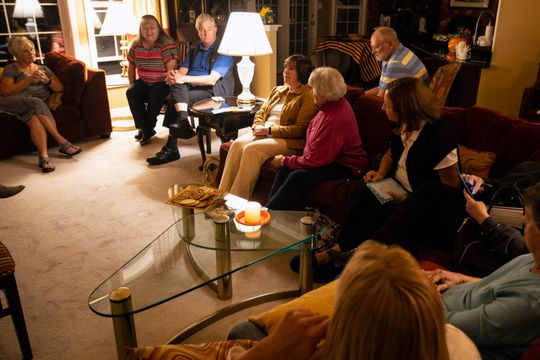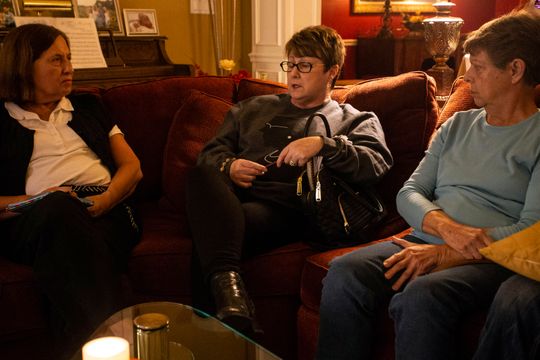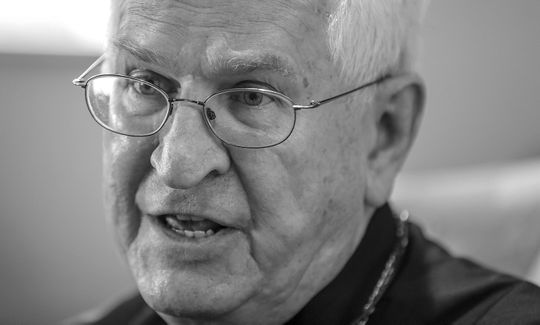Sex Abuse Survivors: Archbishop Kurtz Isn't Doing Enough to Protect His Flock
By Caitlin McGlade
Yet, he retained Chancellor and Chief Administrative Officer Brian Reynolds, who in the Kelly era helped negotiate settlements that kept cases of abuse from going public. Kurtz allowed a priest under investigation for abusing a child to live in a church rectory. He supported a Vatican decision to make the Most Rev. William Medley bishop of Owensboro over the objections of abuse survivors who say he participated in Kelly's cover-ups. And Kurtz hasn't always listened to abuse survivors, Pfeiffer said. In an email to the Courier Journal, Kurtz wrote that he agrees with those who say the church needs to squarely face the truth about sexual abuse. "Silence is not the answer," he wrote. "There may have been judgment calls made over the years that individuals disagree with, and I respect their right to disagree." Kurtz's administration recently promised to seek advice from survivors but hasn't increased accountability. "Unless the persons responsible for this hideous culture of hiding priests and protecting them are removed from the positions of power, the culture is still going to remain as an intrusive ghost that reverts back to its old ways," said William McMurry, a lawyer who represented hundreds of local abuse victims. "I thought Brian Reynolds would be the first person to go." Troubled legacy The Pennsylvania grand jury report hit home for Kurtz, who served in the Allentown Diocese for 27 years. He has said he was unaware of the allegations covered in the report, which doesn't implicate him in any way. He's called it "a troubling indictment that church leadership, called to holiness and chastity, did not provide an example for all of society in dealing with these issues." Kurtz's response to the report included an Oct. 5 special service at Holy Family Church in Camp Taylor that began with a hymn, “In a time of pain.” “Come save us as you saved your Son from corruption’s deadly toll,” about 100 churchgoers sang. “May we rise at last from our shadowed past with your love as our guide and goal.” Brian Reynolds was there, several rows behind Cal Pfeiffer. Reynolds has held top positions in the archdiocese since 1990. In lawsuit depositions in 2002, he acknowledged he helped arrange payments to victims, with conditions attached. In 1995 he helped arrange payment for counseling and medical care for Robert Mattingly, a former altar boy repeatedly abused by the Rev. Arthur Wood. The $10,500 came with strings — keep it secret and promise not to sue. “Since Father Wood was already deceased, it was about developing confidentiality just to support the privacy of individuals involved, either the person, Mr. Mattingly, or the archdiocese,” Reynolds said in a deposition. McMurry, the victims' lawyer, questioned the offer. “Well, it’s usual and customary and had been used as a tool to avoid scandal; isn’t that true?” McMurry asked. “… I don’t know what the particular motivation was,” Reynolds responded. Mattingly, who died in 2008, later joined the survivor's lawsuit after learning church staff knew Wood had abused others but kept quiet. In a recent interview, Reynolds said it's wrong to assume the church forced a confidential settlement on Mattingly, but would not elaborate. Though confidential settlements are widely criticized, Reynolds said victims sometimes wanted them, and the archdiocese never tried to take back money if a victim went public. Reynolds also helped develop a now-discredited policy that allowed abusive priests to remain in restricted ministry while other employees were fired for the same offenses. The policy, in place from 1993 to 2002, noted a possible legal obligation to promptly report child abuse but also declared that, "No action or investigation of any nature should be initiated at the local level without the explicit authorization of the Archbishop.” Complaints remained in-house unless a committee decided to call police. Reynolds said he had nothing to do with priest assignments. While he helped develop the policy, he was not responsible for implementing it. "It was insufficient policy," Reynolds said. "I didn't make it up, (and) say, 'Hey this is a good idea. That's not what we did. We collected the norms around the country and wrote them in our version." Reynolds in a deposition said Kelly asked him to help draft the policy without telling him about abusive priests. He acknowledged knowing of an abuse allegation against Miller in 1995, but he said he had no information about the case and only helped calculate victim counseling costs. Miller remained in ministry for seven more years, ultimately was named in 70 lawsuits by abuse victims and was sent to prison. Kurtz won't gain survivors' trust as long as Reynolds remains at his side, said Michael Diebold, Frank's brother. "There was a lot of hurt that was never addressed and wounds that weren’t healed," he said. "The thread that didn't change under Kelly, and under Kurtz is Brian Reynolds." Carol Harris, a Louisville Catholic and organizer of the group lobbying for a Kentucky grand jury, said Kurtz sent a message by keeping Reynolds: Maintain status quo. "Yes, we want to forgive. That doesn't mean you turn your back on it and just let it go," she said. "There needs to be accountability first." Reynolds said he's had "healing, reconciling conversations" and positive relationships with many abuse victims but understands that some are frustrated. "What happened to them was outrageously not only criminal, but it's sinful, it's evil," he said. "They have every right to be angry." Reynolds said many people associate him with the scandal because he represented the archdiocese in 750 media interviews. He also notes that he helped establish that the church should help pay for victims' therapy and set up face-to-face sexual abuse training for all staff and volunteers who work with children. The training students receive in school, he said, has empowered them to report abuse they see anywhere. "I believe the church is much better ... but that doesn't mean that makes what happened before 2002 right and OK," Reynolds said. "And to whatever degree I was part of the things before 2002, my hard efforts since then don't make up for that." Kurtz in an email expressed "every confidence in (Reynolds') competency and faithful service." He called Reynolds a "crucial leader" who "navigated the very difficult process of reaching a just settlement with victim survivors." A bishop with a past SNAP has long faulted Kurtz for not taking action against Medley, who, as clergy personnel director from 1989 to 1993, helped handle reassignments for five priests facing sexual abuse allegations, as the Courier Journal reported in 2010. Medley was a Louisville-area pastor when Kurtz arrived in 2007. In 2009, Pope Benedict XVI made Medley bishop of Owensboro. Kurtz led his consecration. Miller and the Rev. Daniel C. Clark were among the priests with whom Medley worked. Clark was convicted in 1988 of sodomizing one boy and sexually abusing another. He spent 90 days in a work-release program and 5 years on probation. Clark was convicted again in 2003 for abusing two brothers from 1998 to 2002. He served nearly half of a 10-year prison sentence before being paroled as a registered sex offender. Between his convictions, Clark was a chaplain for volunteer fire departments and other organizations. The archdiocese left it up to him to tell the groups about his past. Many later said they didn't know the court had restricted his contact with children. Miller was accused of molesting 52 boys and four girls for decades. After abuse allegations surfaced in 1989, he told a psychiatrist he "acted out sexual impulses" involving children his entire adult life. The church arranged therapy. In 1990 Medley wrote a memo saying Miller “filled him in” about his pedophilia, and would be ready to resume duties after a sabbatical, a retreat and a "Spiritual Direction" workshop. Miller was a nursing home chaplain until Kelly removed him and he retired in 2002. Medley also investigated allegations against two other priests in the 1990s, telling Kelly their victims were unlikely to object to them remaining in ministry. New accusations prompted their removal a decade later. And in 1990, after a man reported the Rev. Joseph Stoltz molested him as a kid, Medley sought only to move the admitted pedophile to a Park Hill parish with "few youth." "Given Joe's history, Saint William might be a very good assignment in that there are so few youth and children who participate in that parish and there are no programs geared expressly for them," Medley wrote to Kelly. Kelly later informed Medley that he wanted to "silence" Stoltz's victim, who was paid $200,000 in 1992, according to court records. Stoltz was removed from ministry in 2002. Risk for 'so few' children
Mike Montgomery, a Bowling Green Catholic, recently called for an investigation after reading Medley's memo about Stoltz posted at Bishopaccountability.org. "They were using the children of that parish as guinea pigs," he said. "Even if there's just one child, my God — so now we have a quota system in the church? If there's less than X amount we can use them as guinea pigs, but if there's Y amount, we're not going to? Really, Father?" Montgomery asked Kurtz to investigate. His request was forwarded to other church authorities because the archbishop doesn't oversee Medley. Just before Medley's 2010 consecration, the Louisville chapter of SNAP implored Kurtz to hold him accountable. He hoped Kurtz would at least to alert the Vatican. "Fr. Medley's promotion seems to be consistent with other diocese throughout the U.S. where those who participated in protecting sexually abusive priests and moved them from one assignment to another (and) did little to protect the most vulnerable, our children, are promoted instead of reprimanded or arrested," Pfeiffer wrote, enclosing copies of court papers cited in this article. More: Louisville's Archbishop Kurtz: Priest sex abuse report is 'deeply painful' Kurtz dismissed Pfeiffer's concerns, writing back that Medley showed commitment to the church's current abuse policy by meeting with a SNAP member before moving to Owensboro. Survivors of abuse by Miller and Clark were outraged. "I look at Dan (Clark) and I look at Louis Miller and I'm like, 'These guys are like heroin addicts or alcoholics. They're driven by a compulsion. They can't help themselves because an urge drives them,'" said Clark victim Jeff Koenig. "What was Medley's excuse? What sickness forces people to move pedophiles around?" Medley told the Courier Journal that Kelly controlled priest assignments. He said he followed church protocol that allowed restricted ministry if a therapist determined it safe, and didn't call the police because the crimes were in the past. He said he now reports every allegation to authorities and recently reviewed Owensboro's records to determine if any accusations against priests were ignored. He published a report on Oct. 8 showing that his diocese knows of 66 allegations by 62 people against 27 unidentified priests since 1937. He has also hosted listening sessions to hear concerns or answer questions about the abuse crisis. When asked if he wishes he'd done things differently decades ago, Medley said he'd have to determine if any of the priests molested again after reassignment. "I'd like to tell you that I was wiser than everyone around me, but I felt like we were doing the best we could with the information that we had," Medley said. "We were doing what we thought we could to protect children. We learned that what we were doing wasn't working that effectively." That's not enough for Miller victim Frank Diebold. "It's like the guards at the concentration camps saying they were just following marching orders. Where is the morality in it?" Diebold said. "If the institution wants to clean up its act and gain credibility, it needs to take all those people and throw them out." Pope Francis recently wrote that accountability and zero tolerance of abuse will help “guarantee a greater culture of care.” "Where's Medley's accountability?" Montgomery asked. "I went into this with an unbelievable faith in the Catholic Church and it's been shaken. Will I have my faith in God and will I always believe in Jesus Christ? Absolutely. I may not do it through the Catholic Church." On Kurtz's watch
While three Louisville-area priests have been sent to prison in recent years, new allegations of sexual abuse during Kurtz's tenure are rare. Still, activists say the archdiocese continues to mismanage the issue. Critics say Kurtz put children at risk by allowing the Rev. James Schook to live in the St. Therese Church rectory from July 2009 to April 2010 while under investigation for molesting a child. He was later convicted and sent to prison. As recounted in a later wrongful termination lawsuit, the parish bookkeeper, whose husband was abused in that rectory as a child, watched in horror as Schook roamed the grounds, often wearing swim trunks and a T-shirt while interacting with parishioners and their children. Bookkeeper Margie Weiter confronted St. Therese's priest, the late Rev. Anthony Olges. He told her to say nothing if she wanted to keep her job. Olges fired her when she warned parishioners to keep kids away from the rectory. The archdiocese later said the parish just couldn't afford to pay her. The archdiocese Human Resources Department ultimately told Weiter and her husband to find another church. It was heartbreaking for a family that had called St. Therese home for decades. Weiter's husband Gary tried to reach Kurtz in June 2010 but was told he was out of state and unable to meet for the rest of the summer — contrary to his published schedule, according to the Weiter's legal complaint. "They were blackballed out of that church," said their attorney, Mikell Grafton. "They had put in 20 years of volunteer work and every kind of devotion to the church itself they could have possibly done. And they dropped them like a hot potato." Reynolds said the parish was far less active than most, and it was Olges' idea to house Schook there. He acknowledged it "probably felt like salt in the wound" for the Weiters. He said the archdiocese later helped Weiter get a better job at a different church. Kurtz said Schook was not supposed to have contact with any parishioners or present himself as a priest while living in the rectory. He said that today he wouldn't put a priest under investigation in a church rectory. "I think I would look for other arrangements," he said. "I think in general any way we can seek ways to remove the person as fully as possible from any contact would be important." Spiritual healing? The charter of the United States Conference of Catholic Bishops says the church must consistently reach out to victims and their families because the first obligation is to offer healing and reconciliation. The archdiocese recently completed a third-party audit that praised its compliance with that charter. Yet about a dozen survivors say they have struggled to meet Kurtz for healing or to give him pointers on abuse training, said Jeanette Westbrook, a social worker who deals with sex trafficking victims. "It's so sad to see them bang, bang, bang their heads on the doors of the Catholic Church and be met with silence," Westbrook said. Survivors want to see the archbishop because they're taught that he has a line to God, but often are referred to the church's victim assistance unit. Sometimes they're told the archbishop doesn't have the time, can only meet under unworkable circumstances or that lawyers advise against it, she said. That's what happened to Michael Norris when he sought spiritual healing after his abuser, the Rev. Joseph Hemmerle, was convicted and sent to prison last year. He was told the archbishop couldn't see him because the criminal case was ongoing. "(The abuse) ruined my spirituality,'' Norris said. "It's like they don't care about me and my soul." McMurry called the rejection "absolutely unjustifiable." "The fact that a criminal case is pending against a priest does not require that the archdiocese refuse to hear the survivor’s story," he said. Kurtz did offer to meet Norris in 2014. Norris said he canceled after getting "cold feet." Kurtz said he has met with many survivors and their families, and will continue to do so. "There may have been a few instances when a meeting request came in during a pending criminal action, and I accepted the advice of legal counsel not to meet at that particular time, but this is not a common occurrence," Kurtz said. "I also recognize that lawyers may disagree on this advice." Kurtz said survivors should get in touch. Pfeiffer said that's backwards — Kurtz should reach out and be willing to meet away from church property, where many fear to go. "The church should be proactive, not reactive, waiting for someone to knock on their door or give them a call," Pfeiffer said. "Because the survivors are not going to do that. They don't trust them."
|
.
Any original material on these pages is copyright © BishopAccountability.org 2004. Reproduce freely with attribution.


